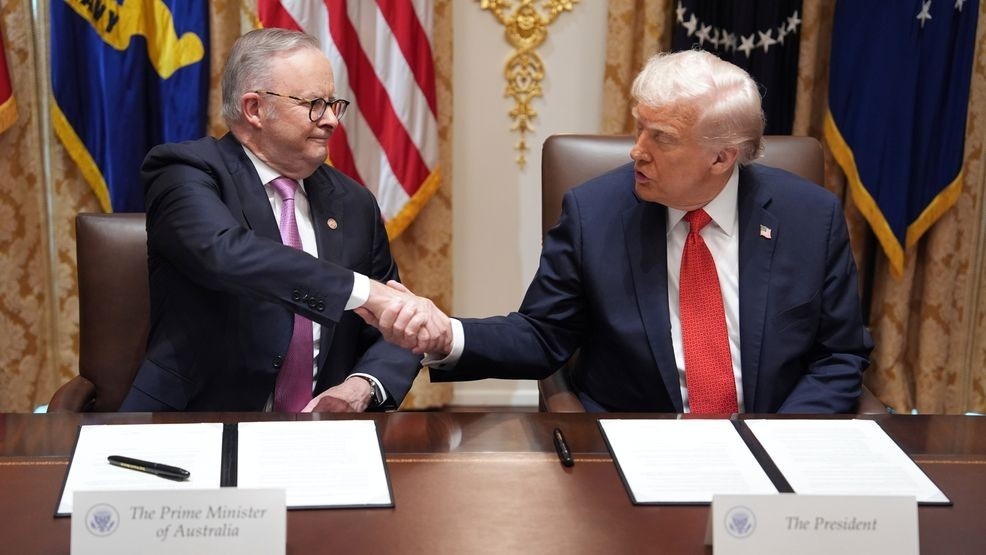Description
WASHINGTON (TNND) — The Trump administration took another step in its bid to find new sources of critical minerals and rare earth metals to reduce the country’s dependence on China for the resources that are key ingredients in a wide range of industrial goods.
President Donald Trump and Australian Prime Minister Anthony Albanese agreed to a deal that they said will generate projects worth up to $8.5 billion in the coming years. The U.S. and Australia invest $3 billion in the next six months to start creating a pipeline of critical mineral projects in both countries, including a Pentagon investment for an advanced gallium refinery in Australia.
The U.S. is trying to make deals with allies and its own investments to build out a bigger supply chain for rare earth minerals to break free of the global reliance on China, which mines some 70% of them and handles around 90% of the refining process. The resources are critical for many modern manufacturing processes, renewable energy and military equipment.
Despite the importance to manufacturing and national security, it is still highly difficult to make mining and refining projects profitable, which has limited the scale of the industry outside of China. New projects are highly capital intensive and require lengthy permitting processes, expensive specialized equipment and a high-skill workforce.
In Australia, the U.S. is trying to add cooperation with a country that already has a robust mining sector that can ramp up production of other materials. Australia is estimated to have around 5% of the world’s reserves of rare earths and accounts for some 8% of global production with an already robust mining sector.
Trump and Albanese hailed the deal as a landmark step in breaking through some of China’s dominance on the rare earth and critical minerals supply chains, though there are questions about how quick and impactful it will be.
“In about a year from now we’ll have so much critical mineral and rare earth that you won’t know what to do with them," Trump said during their meeting at the White House. "They’ll be worth $2.”
But mining the deposits is just the start of a long and complicated process. Permitting for a new mine can take several years, building and expanding capacity in refineries to process the materials is also time-consuming, and it will also take time to build out the supply of skilled workers and specific equipment for projects.
“What I worry about is we’re going from zero to infinite,” said Ian Lange, associate professor of economics and business at the Colorado School of Mines. “Is all the equipment there? Are all the people there? Can everybody ramp up at once? Our evidence from the electricity sector with gas turbines is no.”
While the U.S. has taken more steps to increase its mining and refining capabilities, it is decades behind China, which has spent years protecting and supporting its industry and protecting its dominance of the global supply chain. Beijing has frequently weaponized its grip on rare earths and critical minerals in trade disputes, including this month amid a tariff spat with the White House.
China announced earlier this month that it was adding more restrictions to its exports of rare earth minerals that have escalated trade tensions with Beijing and added new urgency to diversifying the United States’ supply chain for them. Of the 50 minerals designated by the Department of the Interior as being strategically critical, China is one of the largest producers of 30 of them.
The U.S.-Australia agreement also said the governments will financially intervene if projects are not viable commercially in a direct counter to China’s frequent moves to flood the global market with rare earths to drive prices down and force competitors out of business. Details on how that will work are not finalized, but the agreement suggested there may be price floors on materials along with working with international partners to develop a framework to deal with pricing issues.
“There's only so many things you can do to counter some of that behavior without basically just becoming China,” Lange said. “It's going to be this interesting balance of how close they get to running of the economy relative to these concerns they have over too low prices stopping investment.”
Expanding domestic production and finding other suppliers of rare earths and critical minerals has been a U.S. priority dating back to Trump’s first term and was also a key initiative during the Biden administration. The White House agreed to a deal with Ukraine to invest in its mineral reserves, and Trump and also talked about reserves in Greenland and Canada.
Trump also signed an executive order this year leveraging the Defense Production Act to increase the domestic production of critical minerals that includes indentifying sites where production can take place, developing financing methods for projects and pulling back on environmental and permitting roadblocks.
Other Related News
10/21/2025
Gray News - Walmarts annual Thanksgiving meal baskets are back this year with what the com...
10/21/2025
DOUGLAS Ga WALB Douglas Police are investigating a death reported on October 18 that is l...
10/21/2025
WALB is working to produce a video for this story In the meantime we encourage you to watc...
10/21/2025
WALB is working to produce a video for this story In the meantime we encourage you to watc...
10/21/2025








